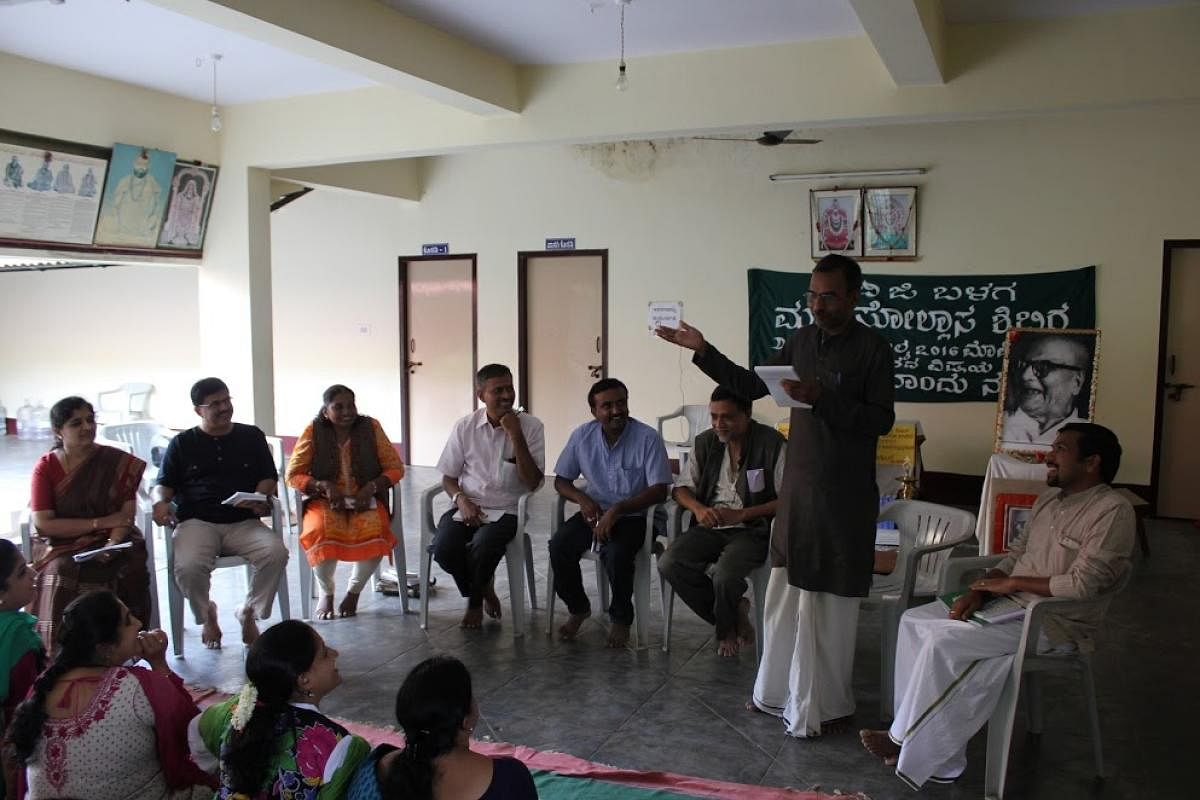D V Gundappa’s 75-year-old masterpiece Mankuthimmana Kagga, has become a source of strength, and a foundation for friendship for many Kannadigas residing across the State and outside. How did this happen? Well, it’s a simple story situated in our everyday. It all began in March 2008, when Nandini and her husband Kanakaraju, a bank employee, started DVG(D V Gundappa) Balaga group, to honour the writer-poet-philosopher and spread the message of his kaggas(four-line verses).
Exposure to poetry
Every week, literature enthusiasts would gather in the couple’s house to decipher the verses and understand their deep meaning. Each time Kanakaraju was transferred, he and his wife would start a new chapter of the balaga(fraternity) in that region. It was set up in Mysuru, Pune and now it is located in Mangaluru.
Over the past 10 years, DVG Balaga has connected people from various walks of life and helped them in forming a bond with their mother tongue. Uma Peshwa, who teaches in an English medium school, says, “I’ve always loved the language. We used to get Kannada newspaper at home every day. I wanted to learn more about Kannada literature but somehow I could never pursue it.” Meeting Kannada literature enthusiasts, discussing with them about writers and philosophy has brought Uma closer to the world she always wanted to be a part of. From being a listener and reader, she has now started writing in Kannada.
WhatsApp has played a major role in keeping the group’s activities running. Nandini has taught herself to use the video-editing software, through which she creates short clips with recitals of each of the 945 kaggas.
Kanakaraju and Nandini send out such clips every morning, along with a voice note and a text that includes the meaning and interpretation of the verse. “We have six different WhatsApp groups for the DVG Balaga. We also post it on our Facebook page. The messages reach about 10,000 people per day. People are so fond of it that if for some reason, we are not able to send it even on one day they start asking us about it,” says Kanakaraju.
He calls these messages ‘kagga therapy’. “People are stressed and face a lot of pressure in their daily life. Now, they are seeking spiritual knowledge and guidance of gurus for relief. And, the kaggas are all about the meaning of life. If one reads and tries to understand them, one can find solutions to many of life’s problems,” he adds. The kaggas have helped people in different ways. For instance, in the case of Dr V Virupaksha Devaramane, a psychiatrist, it has helped him connect with his patients in a better way. “I had read some of the kaggas before, but I never really grasped their depth. Then, I came across DVG Balaga’s discourses and I realised there was philosophy in them. It could be part of what we call preventive psychiatry, as the verses talk about having good familial relations and values,” he says.
For Nandini, DVG Balaga has been a wonderful experience. “With my first salary, I bought the book Kaggakkondu Kaipidi but never read it. My interest in DVGs work began only after marriage when my husband showed me a kagga recital,” she says. Talking about the groups the couple leave behind, Kanakaraju says, “Once I move unfortunately the activities fizzle out. In some places like Shivamogga, Mysuru, and Bengaluru, I have friends who are trying to organise events. In Pune, it has completely stopped, but it’s okay because my intention is to create awareness about literature.” Since the fraternity mostly functioned online, people knew each other only virtually. In 2016, it was decided by the members that they meet in person.
Meet and greet
So, a two-day camp called the ‘Manasa Ullasa’ was organised in Mavinakere, Hassan, and about 50 of them met there. “Everyone wanted to meet and get to know each other, so we had this camp. The theme was to discuss DVG’s book Baligondu Nambike and the meaning of life. We spoke of finding meaning in our lives and simplicity,’’ says Kanakaraju.
The memories of the camp are still afresh for Sumana Ramanand, a resident of Chennai, “It was something different and new. I had known all these people only through WhatsApp groups, but I felt like I had known them for years. People sang, gave talks, and played instruments. It was nice to see people from different professions coming together and showcasing their talent,’’ she adds.
This year has been quite special for the group because now it has been converted into the DVG Balaga Trust. “We want to promote Kannada literature by publishing more books, and also translate DVGs works into English so that it can reach people. We also want to take up activities to uplift those from low-income backgrounds,” says Kanakaraju.
The trust recently released its first book, ITinda Meti, written by Vasanth Kaje, a software engineer-turned-farmer. It aims to release more books, particularly for children, on various topics.
